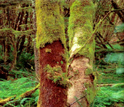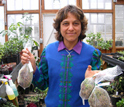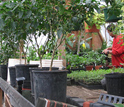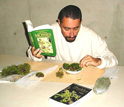|

Press Release 08-186
Inmates Conduct Ecological Research on Slow-growing Mosses

Moss-in-Prisons project helps promote sustainable living
October 17, 2008
Nalini Nadkarni of Evergreen State College currently advises a team of researchers who sport shaved heads, tattooed biceps and prison-issued garb rather than the lab coats and khakis typically worn by researchers. Why is Nadkarni's team composed of such apparently iconoclastic researchers? Because all of her researchers are inmates at Cedar Creek Corrections Center, a medium security prison in Littlerock, Washington. With partial funding from the National Science Foundation (NSF), Nadkarni has guided her unlikely but productive team of researchers since 2004, as they conduct experiments to identify the best ways to cultivate slow-growing mosses. Nadkarni's so-called Moss-in-Prisons project is designed to help ecologists replace large quantities of ecologically important mosses that are regularly illegally stripped from Pacific Northwest forests by horticulturalists. Why did Nadkarni recruit inmates into her research team? "Because," she explains, "I need help from people who have long periods of time available to observe and measure the growing mosses; access to extensive space to lay out flats of plants; and fresh minds to put forward innovative solutions." In addition to managing the Moss-in-Prisons research at Cedar Creek, Nadkarni helps the facility's inmates run various projects that promote sustainable living--including an organic garden that produces 15,000 pounds of fresh vegetables every summer, a bee-keeping operation and a composting operation that processes one ton of food per month. One member of Nadkarni's research team, who was released from Cedar Creek, enrolled in a Ph.D. program in microbiology at the University of Nevada and presented his Cedar Creek research at the annual meeting of the Ecological Society of America in August 2008. Nadkarni started the Moss-in-Prisons project with a type of NSF award that is specially designed to help scientists reach out to public audiences. More recently, she has received additional funding from the Washington State Department of Corrections. In addition, Nadkarni has creatively stretched project resources by recruiting other NSF-funded researchers to contribute to a popular lecture series that she started at Cedar Creek. By giving such lectures, these scientists fulfill requirements for conducting public outreach that accompany NSF awards. A recent TV news report about the Moss-in-Prisons and the sustainability projects at Cedar Creek is posted at http://www.kcts9.org/video/green-prison-reform.
-NSF-

Media Contacts
Lily Whiteman, National Science Foundation (703) 292-8310 lwhitema@nsf.gov
Jason Wettstein, Evergreen State College (360) 451-3167 wettstej@evergreen.edu
Program Contacts
Alphonse DeSena, National Science Foundation (703) 292-8310 adesena@nsf.gov
Principal Investigators
Nalini Nadkarni, Evergreen State Collge (360) 867-6621 nadkarni@evergreen.edu
Related Websites
NSF Discovery: Tree-Climbing Scientist Makes Surprising Discovery: http://www.nsf.gov/discoveries/disc_summ.jsp?cntn_id=110650&org=NSF

The National Science Foundation (NSF) is an independent federal agency that
supports fundamental research and education across all fields of science and
engineering, with an annual budget of $6.06 billion. NSF funds reach all 50
states through grants to over 1,900 universities and institutions. Each year,
NSF receives about 45,000 competitive requests for funding, and makes over
11,500 new funding awards. NSF also awards over $400 million in
professional and service contracts yearly.
 Get News Updates by Email Get News Updates by Email
Useful NSF Web Sites:
NSF Home Page: http://www.nsf.gov
NSF News: http://www.nsf.gov/news/
For the News Media: http://www.nsf.gov/news/newsroom.jsp
Science and Engineering Statistics: http://www.nsf.gov/statistics/
Awards Searches: http://www.nsf.gov/awardsearch/
| 







